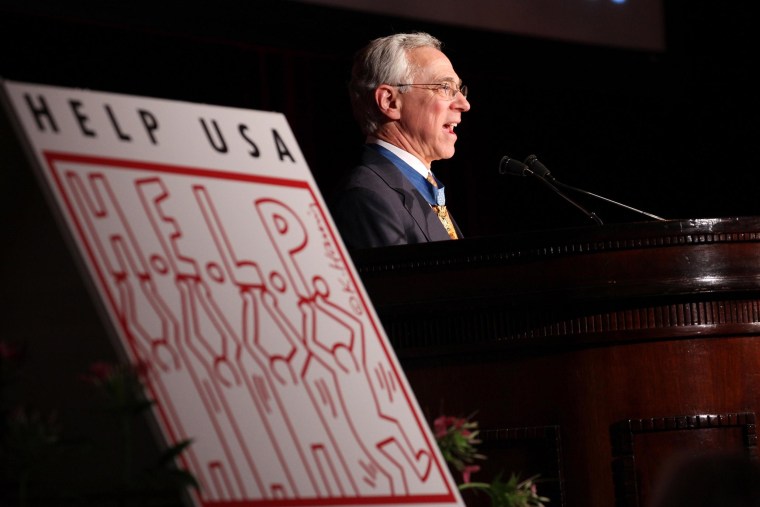The following article is opinion and the views expressed are solely those of the author.
On Thursday VA Secretary Eric Shinseki was grilled by members of Congress about significant and perhaps deadly delays in health care for America’s veterans. Some on Capitol Hill, and some leaders of veterans organizations, have demanded his resignation.
But the problem with the VA is not its boss. It doesn’t matter whether Eric Shinseki stays or goes, or whether he’s done a good job during his five-year tenure in trying to address the VA’s many long-term issues in delivering quality care. The problem is the VA. The medical component of the Department of Veterans Affairs needs to be abolished. We need to shut the doors of the thousands of medical facilities around the country that are failing to serve our veterans.
Eric Shinseki, whom I have known for many years, had an illustrious career as a soldier. A graduate of West Point, he was severely wounded in Vietnam. As Army Chief of Staff in 2003, he warned that the post-combat mission in Iraq would require several hundred thousand troops. He was vilified for his views by some in the Pentagon, and by U.S. officials who had no combat experience to inform their own opinions, but he was proven right.
As VA Secretary, he did not prepare his department for the enormous increase in caseload it has faced because of aging Baby Boom veterans and the influx of Iraq and Afghanistan veterans. He bravely – some say foolishly – decided that VA care would be available to all veterans with either post-traumatic stress or illnesses that result from exposure to Agent Orange. As a result, waiting times for evaluation and care stretched to as long as two years, earning him a fresh helping of abuse and probably convincing him that no good deed goes unpunished.
Since then, backlogs have been greatly reduced, and care at many VA hospitals is as good as that at other facilities. But no matter. Gen. Shinseki would be the first to remind his critics and supporters alike that he is responsible for everything that happens, or does not happen, in his department.

It’s a common response in a situation like this to ascribe the failure to leadership and replace the leader. We do this all the time in politics and business, and it’s a measure of our misunderstanding of the nature of bureaucracy that we are shocked when things don’t improve much.
Sometimes, we need to think more strategically about solving problems, and a place to start is by asking ourselves what we want and need from the Department of Veterans Affairs.
The relationship between the VA and the American public used to be a very close one. The VA was founded and then expanded to a huge size to serve the needs of veterans at a time when we had lots of them, when nearly every household included someone who wore, or once wore, a uniform.
Interactive Map: VA Hotspots at Center of Scandal
That’s no longer the case. Most Americans no longer know anyone in uniform, and so for many, military service, and the obligation to take care of those who serve, has become an abstraction. We say we love our troops, but that’s because we don’t have to be the troops.
And now we have a huge bureaucracy that most citizens know little about, and our expectations have been mismanaged. We think this large government structure can take care of our veterans, but it can’t, no matter who is in charge, or how much money we throw at it. Bureaucracies are excellent at doing routine things in a routine way, but as any physician can attest, medicine is not routine.
We have created a large bureaucracy with thousands of hospitals, clinics, waiting rooms and employees to deliver medical care, and it needs to be abandoned. It makes no sense to have a parallel universe to take care of our veterans, separate doctors, separate facilities, equipment and even protocols. There is no reason that veterans who would otherwise wait for months to be seen at a VA health clinic can’t be seen by private doctors, the same doctors who treat everyone else. The procedure doesn’t need to be complicated: patient is seen by private doctor, private doctor treats patient, doctor sends bill to government, government pays doctor.
We already have Medicare and Medicaid, which could serve as templates for a veterans program without facilities or physicians. Maybe the Veterans Health Administration, the medical component of the VA, could be absorbed into those systems, with the proviso that veterans shouldn’t have to pay either a premium or a co-pay. Yes, it would still be bureaucracy, but at least it would be less redundant.
I understand that despite the current sound and fury in Washington, there is little long-term will to treat veterans properly or foot the bill for their medical needs. I also understand that the same politicians who usually give veterans’ needs short shrift would be loath to close down the VA facilities in their districts, no matter how dysfunctional. But if we want to deliver the best possible care to our veterans, if we really want to solve this problem, we should stop trying to repair a broken system and consider closing those doors for good.